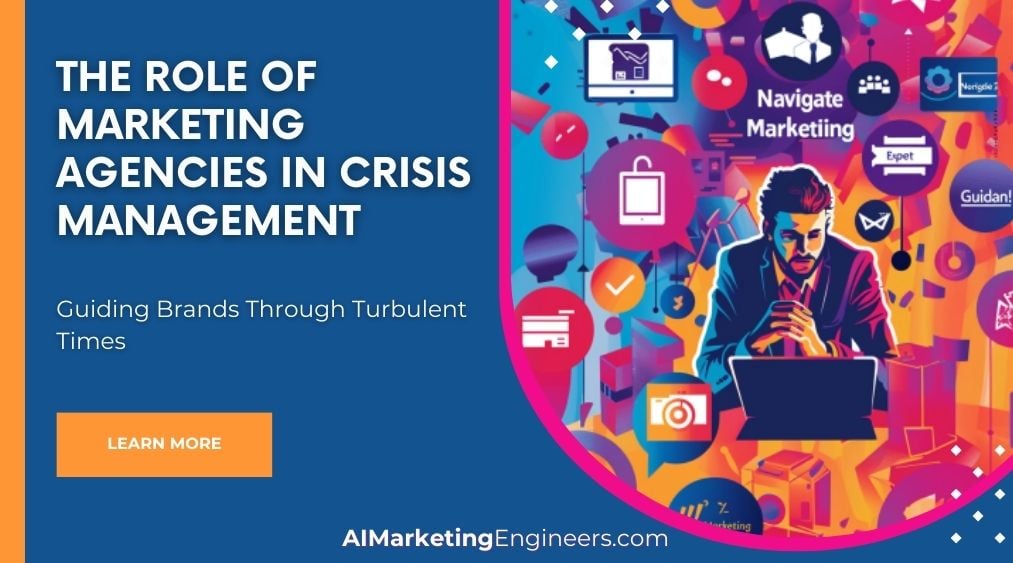Key Takeaways
✅Personalized Client Support: Marketing agencies should analyze each client’s unique situation and marketing data to develop personalized crisis management plans. This includes deciding which campaigns to pause or continue based on return on investment (ROI) and crafting a post-crisis recovery plan.
✅ Diversification and Innovation: Agencies can cope with crises by diversifying services to include e-commerce, website optimization, or internal training programs. Using referral programs and investing in internal projects like SEO and content creation can generate new revenue streams and future-proof the agency.
✅ Effective Communication and Brand Management: Hiring a strong marketing team and developing a clear communication plan is essential for crisis management. It's crucial to keep stakeholders informed and uphold brand values consistently throughout the crisis.

Introduction
How prepared is your brand to face a sudden crisis? Marketing agencies play a pivotal role in helping businesses navigate these turbulent waters, offering strategies that safeguard brand reputation and ensure business continuity. The importance of crisis management cannot be overstated as it directly impacts customer trust and loyalty. This article delves into the essential role marketing agencies play, the best practices they employ, and the innovative strategies they utilize to not only survive but thrive post-crisis. Uncover actionable insights and stay ahead in managing crises effectively.
Top Statistics
| Statistic | Insight |
|---|---|
| Global Crisis Management Service Market Size: The global crisis management service market size was valued at USD Million in 2022 and is expected to expand further. | This shows the growing necessity for crisis management services in an increasingly unpredictable world. |
| Crisis Management Strategy Adoption: Only 35% of survey respondents have a crisis response plan that is crisis-agnostic. | A large majority of businesses are not fully prepared for varied crises, indicating a significant area of improvement. |
| Investment in Resilience: Seven out of 10 organizations plan to increase their investments in building resilience. | This highlights how businesses recognize the growing importance of staying prepared for crises. |
| Crisis Management Capabilities: 95% of business leaders say their crisis management capabilities need improvement. | Enhancing crisis capabilities can lead to more robust responses and reduce the impact of future crises. |
| Crisis Communication Effectiveness: 28% of businesses that have been through a crisis before say they would communicate more effectively with customers next time. | Proper crisis communication is crucial and significantly impacts how stakeholders perceive a company's response. |
Understanding Crisis Management in Marketing
Crisis management in marketing entails planning and executing strategies to address unexpected events that threaten a brand’s reputation and customer trust. Crises can range from financial missteps and technological failures to personnel conflicts, organizational malfunctions, natural disasters, and confrontational situations. Each type affects brand perception differently, but the common thread is the potential erosion of trust if mishandled.
Key Components of a Crisis Management Plan
A robust crisis management plan should have clearly defined communication protocols to ensure consistent messaging. A designated crisis management team is pivotal, as is a thorough risk assessment framework to identify potential threats. Continuous evaluation mechanisms help in monitoring the execution of the plan. Post-crisis, an in-depth analysis and recovery strategy are essential to understand what worked and what didn’t.
Effective Crisis Management Strategies for Marketing Agencies
Marketing agencies need a proactive approach to identify potential risks early. Swift and transparent communication with the public can help mitigate the impact of the crisis. Working closely with internal teams and stakeholders ensures cohesive action. Utilizing advanced crisis management tools helps in effectively monitoring and responding to the crisis. Regular drills and simulations keep the team prepared for real-life scenarios.

The Importance of Social Media in Crisis Management
Social media plays a crucial role as an early warning system for crisis detection. Platforms like Twitter and Facebook enable rapid crisis communication and response. Real-time sentiment analysis helps in understanding public perception and adjusting strategies accordingly. Collaboration with social media teams ensures that the messaging remains consistent across all channels, which is critical for maintaining public trust.
Regaining Consumer Trust Post-Crisis
After a crisis, honest and transparent communication is key to rebuilding trust. Swift resolution of the issues shows commitment to the customer. Demonstrating a commitment to rectifying the situation helps in regaining consumer confidence. A thorough post-crisis review and refinement of the crisis management plan ensure better preparedness for future incidents.
Best Practices for Marketing Agencies in Crisis Management
Building a crisis management team with diverse expertise is essential. Developing a comprehensive crisis management plan tailored to potential threats faced by the organization provides a strategic edge. Conducting regular drills and simulations ensures the plan’s effectiveness. Utilizing advanced crisis management tools improves efficiency and effectiveness. Maintaining brand consistency during a crisis helps in preserving the brand’s integrity and trustworthiness.
By focusing on these strategies and best practices, marketing agencies can not only manage crises effectively but also turn them into opportunities for strengthening consumer trust.

AI Marketing Engineers Recommendation
Recommendation 1: Leverage Data Analytics to Foresee and Mitigate Potential Risks: Marketing agencies play a crucial role in crisis management by utilizing advanced data analytics. According to a study by McKinsey, businesses that use data-driven decision-making are 23 times more likely to acquire customers. Agencies can analyze social media trends, customer feedback, and market conditions to predict potential risks. By identifying early warning signs, companies can develop proactive strategies and avoid financial losses.
Recommendation 2: Strengthen Brand Communication with Transparent and Timely Updates: In times of crisis, clear and honest communication is vital. Research conducted by Edelman reveals that 81% of consumers said they need to trust the brand to do what's right. Marketing agencies should ensure that companies deliver consistent updates, acknowledge issues, and provide solutions. This approach not only mitigates the crisis but also helps in maintaining and building trust among stakeholders, thereby reinforcing the brand's reputation.
Recommendation 3: Utilize AI-Powered Tools for Efficient Crisis Response: The integration of AI-driven tools can significantly enhance the role of marketing agencies in crisis management. Tools like chatbots, sentiment analysis software, and automated response systems can facilitate real-time monitoring and engagement. For example, using AI to analyze customer sentiment on social media can help identify negative trends quickly and respond promptly. This proactive approach helps in maintaining customer loyalty and safeguarding the brand's image.
Relevant Links
- Discover Effective Strategies for Crisis Communication in Marketing
- Boost Your Marketing Resilience with Essential Campaign Execution Strategies
- Navigate Crisis with Ad Monitoring and Real-time Data Tracking
- Harness the Power of Social Media for Crisis Management
- Transformative Strategies for Regaining Consumer Trust Post-Crisis
Conclusion
In sum, The Role of Marketing Agencies in Crisis Management cannot be overstated. Understanding the importance of crisis management in marketing—including various types of crises like financial or technological ones—is essential for maintaining brand reputation and customer trust. Key components of a solid crisis management plan, such as designated communication protocols, a crisis team, and continuous evaluation mechanisms, are indispensable.
Marketing agencies must adopt effective crisis management strategies that include proactive risk identification, transparent communication, and collaboration with all internal and external stakeholders. Social media plays a pivotal role, acting both as an early warning system and a platform for consistent crisis communication. Rebuilding consumer trust post-crisis hinges on honesty, swift issue resolution, and genuine efforts to rectify the situation.
Best practices involve building a diverse crisis management team, conducting regular drills, and leveraging crisis management tools for monitoring and response. With these strategies, marketing agencies are well-prepared to navigate crises, ensuring brand consistency and ultimately safeguarding their clients' reputations. As the landscape of risks and challenges evolves, marketing agencies must stay vigilant and continuously improve their crisis management frameworks.

FAQs
Question 1: What is crisis management in marketing?
Answer: Crisis management in marketing involves developing strategies to mitigate the negative impact of a crisis on a brand’s reputation and sales. It includes identifying potential crises, preparing responses, and executing those responses effectively to minimize damage.
Question 2: Why is crisis management important for marketing agencies?
Answer: Crisis management is crucial for marketing agencies as it helps protect their clients' brands and maintain customer trust during critical situations. Effective crisis management ensures that the agency can respond quickly and appropriately, reducing the risk of long-term damage to the brand.
Question 3: What are the key components of a crisis management plan?
Answer: A crisis management plan typically includes:
- Identifying potential crises and their impact
- Assigning roles and responsibilities within the crisis management team
- Developing response strategies and communication templates
- Establishing protocols for internal and external communication
- Regularly reviewing and updating the plan.
Question 4: How do marketing agencies analyze the root cause of a crisis?
Answer: To analyze the root cause of a crisis, marketing agencies gather information, identify patterns or systemic issues, develop a plan to address the root cause, evaluate the plan’s effectiveness, and continuously improve their crisis management processes.
Question 5: What is the role of data analysis in crisis management?
Answer: Data analysis plays a critical role in crisis management by helping agencies understand the situation, track trends, and make informed decisions. It involves monitoring metrics such as engagement, sentiment, and customer behavior to adjust the response strategy accordingly.
Question 6: How do marketing agencies balance crisis communication with ongoing marketing campaigns?
Answer: During a crisis, marketing agencies should pause non-essential campaigns and focus on crisis communication. They should also consider offering special promotions or discounts to support clients and maintain customer loyalty.
Question 7: How can marketing agencies stay updated with the latest crisis management strategies?
Answer: Marketing agencies can stay updated by attending seminars and conferences, participating in webinars and online training sessions, reading industry publications, following thought leaders on social media, and networking with other professionals in the field.
Question 8: What tools can marketing agencies use to streamline crisis management?
Answer: Agencies can use automated reporting tools, social media analytics, and crisis management software to monitor customer messages, track brand sentiment, and respond efficiently during a crisis.
Question 9: How can marketing agencies measure the effectiveness of their crisis management strategies?
Answer: Agencies can measure effectiveness by conducting regular debriefs, evaluating team performance, identifying areas for improvement, and tracking key performance indicators such as crisis resolution rates and customer satisfaction.

Academic References
- Crisis Management and Service Marketing. This study explores the opportunities for reciprocal learning between crisis management and service marketing, highlighting the importance of integrating marketing strategies into crisis management frameworks.
- Crisis Management and Marketing. This chapter examines the nexus between crisis management and marketing, reviewing literature on crisis management and its implications for marketing strategies.
- Crisis Management in a Complex World. This book provides a comprehensive overview of crisis management, including the role of managerial communications and the focus of top managers in surviving and failing firms during crises.
- Crisis Management Research in Industrial Marketing Management. This study highlights the lack of research on crisis management in industrial marketing management, emphasizing the need for better understanding of how business marketing, relationships, and networks can contribute to managing crises.
- Crises and Crisis Management: Integration, Interpretation, and Future Directions. This review integrates and interprets existing research on crises and crisis management, identifying key themes such as uncertainty, harm, and behavioral phenomena, and providing a framework for future research.








